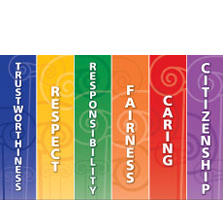
ir
John Templeton was a great believer in the impact of the sorts of universal
truths, or laws for life, contained in timeless proverbs, aphorisms and
wise sayings,” observes Michael Josephson, reflecting on the origins
of the program of character development he has brought to

millions of
youngsters. “In collaboration with the Templeton Foundation, the Josephson
Institute of Ethics and its Character Counts! program created “Foundations
for Life,” a comprehensive critical thinking and character development
program based on profound quotations.”

Josephson reports that Character Counts! now involves more than 7 million
students and their families—the largest such program in America. It would
be difficult to cite any enterprise that better represents Sir John’s
ideals for the inculcation of values among young people. Character Counts!
is actually part of the “Laws of Life” enterprise, though retaining its
own distinctive brand name. The essay writing contest it promotes, entitled
“Foundations for Life,” is identical in its aspirations to the “Laws
of Life” competitions, though it retains certain rubrics of its own to
guide the young writers.

Most notable of these is the theme of the “Six Pillars of Character,”
dividing the issues students address under half a dozen headings: Trustworthiness,
Respect, Responsibility, Fairness, Caring, and Citizenship. Each of these
is sub-divided into more specific topics, ensuring that students have
a wide variety of themes to choose from.

The genesis of this massive initiative goes back to 1992, just five years
after Michael Josephson had sold his successful law school exam preparatory
company and set up the Joseph & Edna Josephson Institute of Ethics
in honor of his parents. The Institute hosted a conference at Aspen,
Colorado, attended by experts in ethics and character development, whose
findings were incorporated in the Aspen Declaration on Character Education.
That was the document which launched the now famous Six Pillars.

The following year, 1993, the Institute put these principles into practical
operation by launching Character Counts! which was supported by a coalition
of just a few national organizations. Today the coalition includes thousands
of schools, school districts, youth service groups, and even whole communities.
Even in its first decade, the practical results were dramatic.

A study of participants in South Dakota showed break-ins to property
had dropped by 50 percent, vandalism by 46 percent, and drug abuse by
32 percent between 1998 and 2000. In St Johns County, Florida, the Character
Counts! program resulted in drug offenses falling to 49 percent of their
previous level, cases of battery to 18 percent, and property offenses
to 17 percent in 2002-2003. The program recorded similar improvements
in California, Maryland, Michigan, and New Mexico.

As these achievements demonstrate, there is much more to Character Counts!
than simply sitting young people down at a desk and telling them to write
an essay. But that is the basic exercise on which it all hinges. Just
as Sir John Templeton frequently used an established axiom as the starting
point for creative reflection, as Josephson points out, the program’s
essays are all based on a maxim relating to character. Josephson is on
record as saying that his favorite maxim is, “pain is inevitable, suffering
is optional.” It is through such maxims that youngsters explore their
own insights into issues of character development.

“Through Character Counts! and its partners,” explains Josephson, “the
quotations carefully selected for different grade levels have been exposed
to millions of students, not only through the essay contest but through
various other spin-offs, including posters.” The maxims set as essay
topics have proved to have a more extensive usefulness, as he describes,
“In addition to the essays submitted, many teachers have used the selected
quotations and the support materials, helping teachers enhance the comprehension
of the quotations and internalize the messages to integrate the profound
truths into their lives.”

The program is supported by the American Association of School Administrators,
the National Association of Secondary School Principals, and the National
Association of Elementary School Principals. The essays conducted under
the Foundations for Life brand are designed to improve literacy as well
as character. Although the actual composition of the essay is an individual
and highly personalized endeavor, it is complemented by discussions and
classroom assignments, giving it a community dimension.

It is the wider community that will ultimately benefit from this extensive
and ambitious initiative that, as the figures already cited demonstrate,
has already had a very beneficial effect on American youth and society.
The Foundation’s collaboration with this outstandingly fruitful program
is an enduring testimonial to the ideals of Sir John Templeton and, even
more significant, a thriving example of the practical application of
his vision for character development among the citizens of the future.



 millions of
youngsters. “In collaboration with the Templeton Foundation, the Josephson
Institute of Ethics and its Character Counts! program created “Foundations
for Life,” a comprehensive critical thinking and character development
program based on profound quotations.”
millions of
youngsters. “In collaboration with the Templeton Foundation, the Josephson
Institute of Ethics and its Character Counts! program created “Foundations
for Life,” a comprehensive critical thinking and character development
program based on profound quotations.”